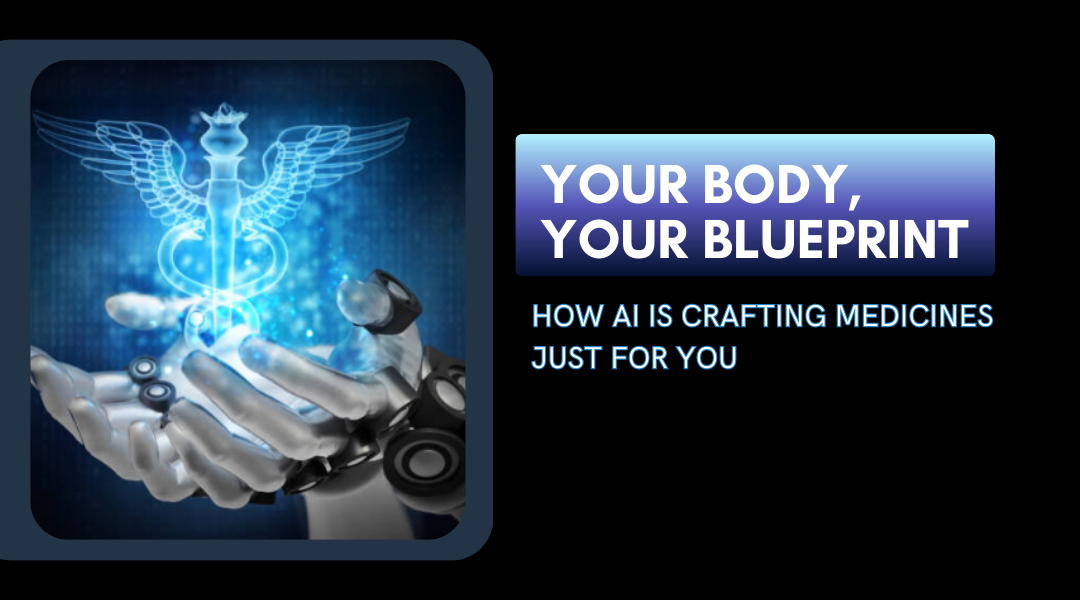Introduction: The End of the One-Size-Fits-All Pill
Remember when doctors prescribed the same blood pressure medication to every patient, hoping it would work? Those days are fading fast. Today, the most exciting breakthroughs in medicine aren’t about mass-produced drugs—they’re about treatments designed for your DNA, your metabolism, your unique biology.
This isn’t science fiction. Thanks to artificial intelligence, we’re entering an era where your medicine cabinet might soon hold drugs as unique as your fingerprint. From cancer to Crohn’s disease, AI is cracking the code on why some treatments work miracles for one patient and fail miserably for another—and it’s rewriting the rules of medicine in the process.
Why Your Genes Demand Custom Care
- The Coffee Cup Effect: Just like some people can drink espresso before bed while others get jitters from decaf, your genes determine how you process medications. A standard dose of warfarin (a blood thinner) might prevent clots in your neighbor but cause dangerous bleeding in you.
- Cancer’s Dirty Secret: Two breast cancer patients might have tumors that look identical under a microscope—but at the molecular level, they’re as different as melanoma and leukemia.
- The Side Effect Roulette: 1 in 5 hospital admissions are due to bad drug reactions. Personalized medicine aims to replace this guessing game with precision.
How AI Plays Matchmaker Between Patients and Drugs
- The Biological Detective
- AI doesn’t just look at your genes—it analyzes how they interact with your proteins, gut bacteria, even your sleep patterns. Researchers at Mount Sinai used this approach to discover why some antidepressants cause weight gain in specific patients.
- Real-world win: For rheumatoid arthritis patients, AI now predicts who’ll respond to expensive biologics like Humira, potentially saving $30,000 per ineffective treatment.
- The Trial Whisperer
- Traditional clinical trials exclude most patients. AI is changing this by identifying “super-responders”—like how Tempus AI found that 7% of pancreatic cancer patients had a rare mutation responsive to a repurposed lymphoma drug.
- The Dosage Architect
- Diabetics at Mayo Clinic are testing AI that adjusts insulin doses in real-time using glucose monitors, weather data (yes, barometric pressure affects insulin sensitivity), and even workout schedules.
Where Personalized Medicine is Beating the Odds
- Lung Cancer’s New Hope: Instead of chemo, patients at MD Anderson get AI-analyzed liquid biopsies that match them to targeted therapies—doubling survival rates for some subtypes.
- The Depression Breakthrough: Alto Neuroscience uses EEG brain patterns to predict which antidepressant will work, potentially cutting the 6-month trial-and-error period most patients endure.
The Catch (Because Nothing’s Perfect)
- Privacy Paradox: Your genomic data is priceless to researchers—and hackers. The 2023 23andMe breach exposed 6.9 million users’ DNA profiles.
- The Zip Code Divide: Right now, these cutting-edge treatments are mostly available at elite hospitals. A cystic fibrosis drug tailored using AI costs $300,000/year—who gets access?
- Doctor Discomfort: A 2024 JAMA study found 68% of physicians distrust AI treatment recommendations. Can we blame them when the algorithms can’t explain their reasoning?
The Tools Making It Possible
- Digital Twins: Companies like Unlearn.AI create virtual copies of patients to simulate how they’ll respond to drugs before real-world dosing.
- Crowdsourced Science: Platforms like All of Us pool health data from 500,000+ diverse Americans, helping AI spot patterns rare in homogenous studies.
What’s Coming Next?
- Precision Prevention: Imagine AI spotting your Alzheimer’s risk 20 years early via subtle speech patterns in your smartwatch recordings, then designing a prevention cocktail.
- Dynamic Prescriptions: Pills with embedded sensors (already FDA-approved for schizophrenia meds) will beam data to AI systems that adjust your dosage overnight.
- The End of Placebos: Future trials may use your digital twin as the control group, giving everyone the real drug.
The Bottom Line
We’re not just personalizing medicine—we’re personalizing health. AI isn’t replacing doctors; it’s giving them a superpower: the ability to see you in all your biological complexity, not just your symptoms. The result? Treatments that fit like a tailored suit instead of a hospital gown. And that’s healthcare worth waiting for.
